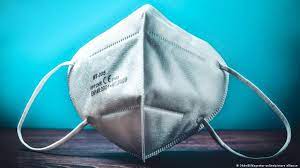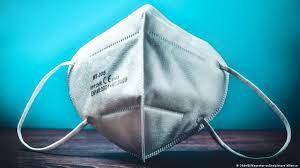
A new form of mask that will glow when its material is exposed to ultraviolet light in the case of the mask being contaminated with traces of the coronavirus has been developed by a team of researchers and scientists at a university in western Japan.
The mask was developed using antibodies that were extracted from ostrich eggs.
Using the masks, it would be easier for people to examine whether they have contracted the virus, said 52 year old Yasuhiro Tsukamoto, who heads the team of scientists who developed the mask at Kyoto Prefectural University. Tsukamoto is also the president of the university.
The team that developed the mask has the target of gaining government approval of commercially selling the masks potentially next year, even while the team is continuing to put the mask through more tests in the real world.
Several different kinds of antibody, or proteins that neutralize foreign entities in the body is produced by Ostriches. According to the scientists, past studies have showed that ostriches have a strong inbuilt resistance to coronavirus.
.
An inactive and non-threatening form of the coronavirus was successfully injected into female ostriches in February last year. Later the team managed to successfully extract a significantly large quantity of antibodies from the eggs that the ostriches laid.
A special filter was then developed by the mask which was put inside the face mask. It is possible to take out the filter and a fluorescent dye containing the coronavirus antibodies from the ostrich eggs be sprayed on it. In the presence of coronavirus, a glow will appear on the filter when exposed to an ultraviolet light.
The team conducted experiments with 32 people infected with the coronavirus over a period of up to 10 days. In that experiment, the team found that all the masks that were worn by the participants glowed when exposed to ultraviolet light. The team also noted a diming of the glow over time when the viral load on the filter deceased.
The next target of Tsukamoto's team is to make the experiment larger with 150 participants. After wearing one of the experimental masks, Tsukamoto found that he himself had been infected by Covid-19. When he exposed the mask to ultraviolet light, it glowed. This was also confirmed by Tsukamoto using a polymerase chain reaction test.
"We can mass-produce antibodies from ostriches at a low cost. In the future, I want to make this into an easy testing kit that anyone can use," Tsukamoto said.
The team also aims to develop the masks further so that a coronavirus infected mask will glow automatically without the need for special lightening.
A veterinary professor, Tsukamoto has researched extensively for years on ostriches and closely studied the manner in which the birds alter their immunity power to combat the bird flu virus as well as allergies, and other diseases.
(Source:www.japantimes.com)
The mask was developed using antibodies that were extracted from ostrich eggs.
Using the masks, it would be easier for people to examine whether they have contracted the virus, said 52 year old Yasuhiro Tsukamoto, who heads the team of scientists who developed the mask at Kyoto Prefectural University. Tsukamoto is also the president of the university.
The team that developed the mask has the target of gaining government approval of commercially selling the masks potentially next year, even while the team is continuing to put the mask through more tests in the real world.
Several different kinds of antibody, or proteins that neutralize foreign entities in the body is produced by Ostriches. According to the scientists, past studies have showed that ostriches have a strong inbuilt resistance to coronavirus.
.
An inactive and non-threatening form of the coronavirus was successfully injected into female ostriches in February last year. Later the team managed to successfully extract a significantly large quantity of antibodies from the eggs that the ostriches laid.
A special filter was then developed by the mask which was put inside the face mask. It is possible to take out the filter and a fluorescent dye containing the coronavirus antibodies from the ostrich eggs be sprayed on it. In the presence of coronavirus, a glow will appear on the filter when exposed to an ultraviolet light.
The team conducted experiments with 32 people infected with the coronavirus over a period of up to 10 days. In that experiment, the team found that all the masks that were worn by the participants glowed when exposed to ultraviolet light. The team also noted a diming of the glow over time when the viral load on the filter deceased.
The next target of Tsukamoto's team is to make the experiment larger with 150 participants. After wearing one of the experimental masks, Tsukamoto found that he himself had been infected by Covid-19. When he exposed the mask to ultraviolet light, it glowed. This was also confirmed by Tsukamoto using a polymerase chain reaction test.
"We can mass-produce antibodies from ostriches at a low cost. In the future, I want to make this into an easy testing kit that anyone can use," Tsukamoto said.
The team also aims to develop the masks further so that a coronavirus infected mask will glow automatically without the need for special lightening.
A veterinary professor, Tsukamoto has researched extensively for years on ostriches and closely studied the manner in which the birds alter their immunity power to combat the bird flu virus as well as allergies, and other diseases.
(Source:www.japantimes.com)





